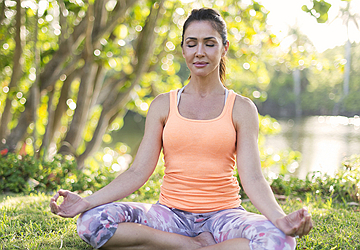The current turmoil of daily existence can make serenity seem like an impossibility. But what if the solution lies in a practice that has been around for thousands of years? Yes, we are talking about the magic of daily meditation. This is a practice that has come to be an oasis of peace and refreshment among the flurry of obligations and commitments. Beyond its foundations in consciousness and spirituality, meditation has been shown to have amazing health advantages that have the capacity to change people's lives in unforeseen ways. As research continues to delve deeper into the realm of meditation's daily benefits, an array of surprising health perks emerges, proving that it's much more than just a mindfulness exercise.

At the heart of meditation lie mindfulness practices. Concentrating on the present moment and eradicating the constant barrage of distracting ideas are key components of the introspective practice of meditation. It is frequently employed as a method for unwinding, lowering anxiety levels, and improving overall health. This kind of presence offers a profound benefit – it empowers us to respond rather than react, bringing a sense of calm and balance to our otherwise chaotic lives.
The beauty of mindfulness is its versatility. Whether you are washing dishes, walking, or waiting in a queue, every moment can be transformed into an opportunity for mindfulness. As a result, the line between daily activities and meditation blurs, paving the way for a more conscious, connected life.
One of the most significant areas where the benefits of meditation shine through is mental health. Labeling it merely as mental health meditation doesn’t do justice to the myriad of advantages it offers:
Reduced Symptoms of Depression and Anxiety: Strategies for meditation, especially practicing mindfulness, have shown promise in easing the symptoms of anxiety and depression. People can break free from destructive thought patterns by practicing judgment-free comprehension of thoughts and emotions. This may result in less ruminating and a shift to more optimistic thinking.
Improved Emotional Well-being: Regular meditation cultivates an increased sense of purpose, stronger connections with others, and heightened self-awareness. This can lead to improved mood, resilience, and overall emotional health.
Enhance Cognitive Function: Advances in cognitive function and mental focus have been linked to psychological methods of meditation, including mindfulness and other meditative practices. These improvements go beyond psychological wellness and have a good impact on all cognitive abilities...
If the aforementioned benefits intrigue you, it’s time to delve into the art of starting a meditation routine. Starting is often the hardest part, but remember, consistency is key. Here’s a simple guide to kickstart your journey:
Find a Quiet Spot: While advanced practitioners can meditate anywhere, beginners might find it easier in a quiet, comfortable space.
Choose a Time: While you can meditate at any time, mornings or evenings can be particularly conducive due to their inherent calmness.
Start Small: When starting a meditation practice for mental health, setting attainable goals is crucial. It enables you to monitor your advancement and maintain motivation by giving you a sense of goal and meaning.
Sharper Focus and Attention: The favorable effects of meditation on focus and attention are among the notable advantages of this practice. The goal of the practice of mindfulness, in particular, is to teach the brain to be completely immersed and engaged in the time at hand.
Choosing a Suitable Meditation Technique: A good meditation practice for mental health depends on choosing the appropriate meditation method. Finding an approach that speaks to you and meets your own goals is crucial because different approaches each provide different advantages.
The journey of meditation is a deeply personal one, filled with introspection and discovery. But one thing remains universal: the undeniable health perks it brings along. From fostering mental well-being to enhancing physical health and even potentially reducing chronic pain and inflammation, the meditation daily benefits are multifaceted and profound.
Moreover, with the increasing integration of mindfulness practices in educational and corporate environments, it's evident that the world is waking up to its importance. Whether it’s about enhancing mental health through meditation or seeking a holistic tool for personal growth, the ancient practice is making a modern resurgence.
While much focus is placed on the mental and emotional benefits of meditation, the physical advantages cannot be sidelined. Daily meditation practice can lead to:
Enhanced Sleep Patterns: Regular meditation can improve the quality of sleep, reducing instances of insomnia.
Lowered Blood Pressure: It has been demonstrated that regular meditation practice lowers blood pressure by encouraging calm and enhancing the function of blood vessels. This might make the circulatory system healthier.
Strengthened Immune System: Meditation can increase the activity of natural killer cells, which are in charge of battling cancer cells and viruses. A stronger immune system results in better general health and disease prevention.
Reduced Aging: Studies suggest that meditation can impact telomere length, potentially slowing down the aging process.
Meditation, in its essence, is about connection — with oneself and with the world around. This naturally spills over into our interpersonal relationships:
Improved Empathy: Daily meditation enhances our ability to understand and resonate with the feelings of others.
Better Communication: Mindfulness practices make us better listeners, paving the way for more meaningful conversations.
Conflict Resolution: With a calmer mind, conflicts can be approached rationally and resolved more easily.

For those who might find it challenging to carve out dedicated meditation time, here are some ways to weave it into everyday tasks:
Mindful Meals: Pay special attention to how your meal tastes, feels and smells. Savor each bite as you eat carefully. This method pushes you to take in every moment as it comes.
Mindful Inhaling and Exhaling: Spend some time concentrating on the air you breathe. Every time your subconscious begins to drift, bring it back to the feeling of each inhalation and exhalation.
Mini Breaks: Use short breaks during work to engage in quick 5-minute meditation sessions.
Like any worthwhile endeavor, the meditation's daily benefits truly shine through when practiced consistently over time. It's not just about starting a meditation routine; it's about sustaining it:
Consistency Over Duration: It's better to meditate for shorter durations daily than to do long sessions sporadically.
Seeking Community: Joining a meditation group or finding a mentor can provide valuable support and guidance.
Regularly Updating Practices: As one advances, it's beneficial to explore various meditation techniques and find what resonates the most.
Meditation, once relegated to the mystical realms of ascetics and monks, is now accessible and relevant to all. With documented benefits for the mind, body, and soul, there's no denying the transformative power of making it a part of one's daily routine. So, whether you're a newbie starting a meditation routine or someone seeking to delve deeper, there’s a world of peace, clarity, and wellness awaiting you. Dive in and experience the magic firsthand!